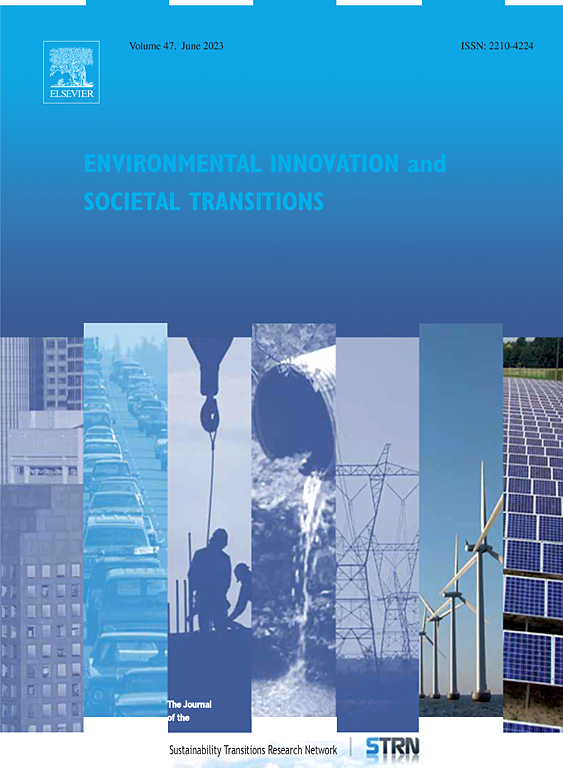作为协调过程的社会技术锁定:追踪塞内加尔农药依赖和蔬菜生产的共同发展(1900-2024)
IF 6.1
2区 经济学
Q1 ENVIRONMENTAL SCIENCES
Environmental Innovation and Societal Transitions
Pub Date : 2025-04-21
DOI:10.1016/j.eist.2025.100997
引用次数: 0
摘要
锁定机制是目前不受欢迎的系统配置持续存在的常见解释。然而,研究经常静态地分析锁定,而没有跟踪和解释潜在的过程。在本文中,我们通过分析塞内加尔蔬菜部门农药锁定的案例研究,探讨了锁定的发展。为此,我们借鉴了大量的档案文件分析。我们通过四个时期(从1900年到2024年)追踪农药锁定,并将其解释为跨多个异质维度的校准过程的结果:农业政策、投入供应、科学技术知识、农场生产和蔬菜商业化;消费。这些方面已经分阶段对齐,助长了对化学控制的日益依赖。迄今为止,这种整体一致性只受到部分挑战,刺激了一些适应,加强了化学强化过程,并使减少农药使用的尝试边缘化。本文最后讨论了一个案例研究中的一致性和偏差,该案例研究来自全球南方农业食品部门的现有文献锁定,然后提出了摆脱当前农药锁定的方法。本文章由计算机程序翻译,如有差异,请以英文原文为准。
Socio-technical lock-in as alignment process: tracing the joint development of pesticide dependency and vegetable production in Senegal (1900–2024)
Lock-in mechanisms are common explanations for the persistence of undesirable system configurations in the present. However, studies often analyse lock-ins statically, without tracing and explaining underlying processes. In this article, we explore the development of lock-in over time, by analysing the case study of pesticide lock-in the Senegalese vegetable sector. To this end, we draw on extensive archival document analysis. We trace pesticide lock-in through four periods (from the 1900s to 2024) and explain it as the result of alignment processes across multiple heterogenous dimensions: agricultural policy, input supply, scientific and technical knowledge, on-farm production, and vegetable commercialisation & consumption. These dimensions have aligned in stages, fuelling a dynamic of growing dependence on chemical control. To date, this overall alignment has only been partially challenged, stimulating several adaptations, reinforcing the chemical intensification process, and marginalising attempts to reduce pesticide use. The paper ends with a discussion of conformities and deviations in a case study from the existing literature on lock-in within the agri-food sector in the Global South, before suggesting ways out of the current pesticide lock-in.
求助全文
通过发布文献求助,成功后即可免费获取论文全文。
去求助
来源期刊

Environmental Innovation and Societal Transitions
Energy-Renewable Energy, Sustainability and the Environment
CiteScore
13.60
自引率
19.40%
发文量
90
审稿时长
56 days
期刊介绍:
Environmental Innovation and Societal Transitions serves as a platform for reporting studies on innovations and socio-economic transitions aimed at fostering an environmentally sustainable economy, thereby addressing structural resource scarcity and environmental challenges, particularly those associated with fossil energy use and climate change. The journal focuses on various forms of innovation, including technological, organizational, economic, institutional, and political, as well as economy-wide and sectoral changes in areas such as energy, transport, agriculture, and water management. It endeavors to tackle complex questions concerning social, economic, behavioral-psychological, and political barriers and opportunities, along with their intricate interactions. With a multidisciplinary approach and methodological openness, the journal welcomes contributions from a wide array of disciplines within the social, environmental, and innovation sciences.
 求助内容:
求助内容: 应助结果提醒方式:
应助结果提醒方式:


